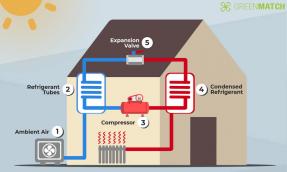
Today, pollution of all kinds affects our planet and our health. Pollution comes in many shapes and forms, but this discussion will focus on specifically indoor air pollutants and the unknown invisible dangers they hold for human health.
Airborne particle pollution can lead to respiratory problems and increase the risk of cancer. Products and machines that emit particulate matter and deadly chemicals are easily inhaled and can decrease one's life expectancy by a substantial amount. Emissions from machinery like cars and diesel generators, and factory smoke outlets, release very small particles that can be found not only in an urban street setting, but also in our schools, offices, and even homes. Diesel generators installed on the top of office buildings, and schools can emit toxic particles, including arsenic benzene, which studies show long term effects link to lung cancer. These particles are so small they can be a fraction of the size of a red blood cell, making them easy to inhale, ingest, and become embedded into one’s body. The frightening thing is that these deadly particles are found in indoor settings where we work, educate our youth, and where we live. These issues are becoming more known only recently, as the technology is just emerging to detect changes in particle levels and because more time is passing and more data is therefore being collected about the long term effects of breathing in these toxic gasses.
As detailed in a recent Newsweek article on the topic, workers installed a cell tower with a diesel generator on the roof of Sto-Rox High School in Stowe, Pennsylvania, outside of Pittsburgh. The generator was releasing toxic fumes that got sucked up into the high school’s ventilation system and dispersed into the classrooms. It wasn't until one of Sto-Rox’s teachers installed a new device in his classroom as a science project that the problem became apparent. The Device is called a Speck and it measures airborne particle pollution. After analyzing data from the Speck, the teacher soon realized that their were spikes in the readings of indoor air quality. The teacher and his class were able to determine that the diesel generator was the root of the problem, and they successfully petitioned to move the generator and the cell tower moved. But how many times does this happen, and no one knows?
This is just one example of the domestic impact of indoor air pollution. It is frightening to imagine how many schools, offices and homes are being infiltrated with toxic particles and gasses. How long you live directly corresponds to the quality of air you’re breathing in each and every day. Air pollutants cause between five and seven million premature deaths annually, and about four million of those deaths are caused by indoor air pollution. Statistics show that urban areas with high populations are being affected the most, and life expectancy rates in these areas are showing direct effects.
Indoor air pollution is a serious issue and we need to take immediate action. Lives are at stake and people need to come together to combat the issue of indoor air pollution by coming up with innovative uses of technology such as the Speck. This type of device gives people a rough but realistic idea of what they’re breathing in, and the information they need to do something about it at an affordable rate. What are your thoughts? How do you think we can solve this problem?
For more Information click the link below:
http://www.newsweek.com/2016/06/10/indoor-air-pollution-revolution-465531.html&" style="display: block" target="_blank">http://www.newsweek.com/2016/06/10/indoor-air-pollution-revolution-465531.html" style="box-sizing: border-box; color: rgb(84, 148, 0); text-decoration: none; word-break: break-word; font-family: Verdana, Arial, sans-serif; line-height: 18px; display: block;" target="_blank">http://www.newsweek.com/2016/06/10/indoor-air-pollution-revolution-465531.html&" style="display: block" target="_blank">http://www.newsweek.com/2016/06/10/indoor-air-pollution-revolution-465531.html</a>
- Keywords : Healthy Buildings, Green Building Resource Center
- ( 12473 ) views

Hi Everyone, My name is James Higgins. I will soon be a junior at Wheaton College, I am currently going for my bachelors degree where I am majoring in both Business and Economics with a minor in Computer Science. At Wheaton I am apart of the lacrosse team along with being actively involved in the Student Business Association and the Investment Club. Before Wheaton I grew up in Duxbury, Massachusetts, graduating from Duxbury High School in 2014.
- ( 0 ) Ratings
- ( 6 ) Discussions
- ( 1 ) Group Posts
Reply/Leave a Comment (You must be logged in to leave a comment)
Connect with us!
Subscribe to our monthly newsletter:

























Not a Member Yet? Register and Join the Community | Log in